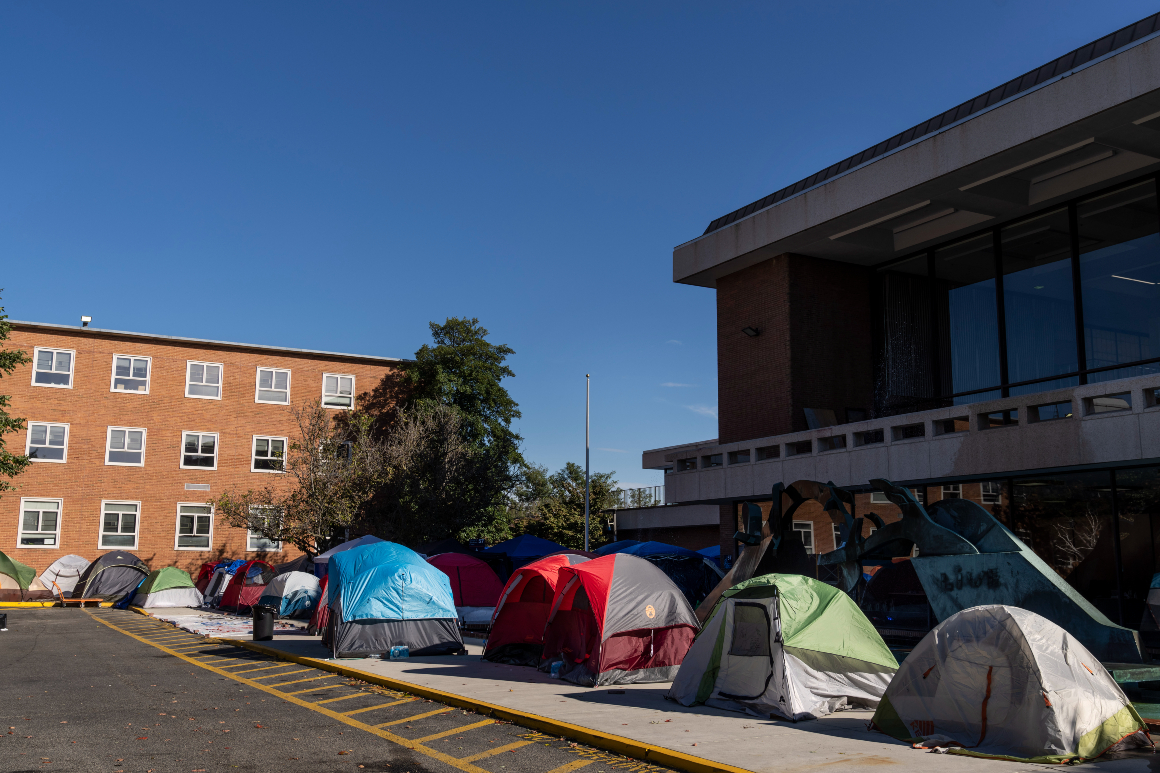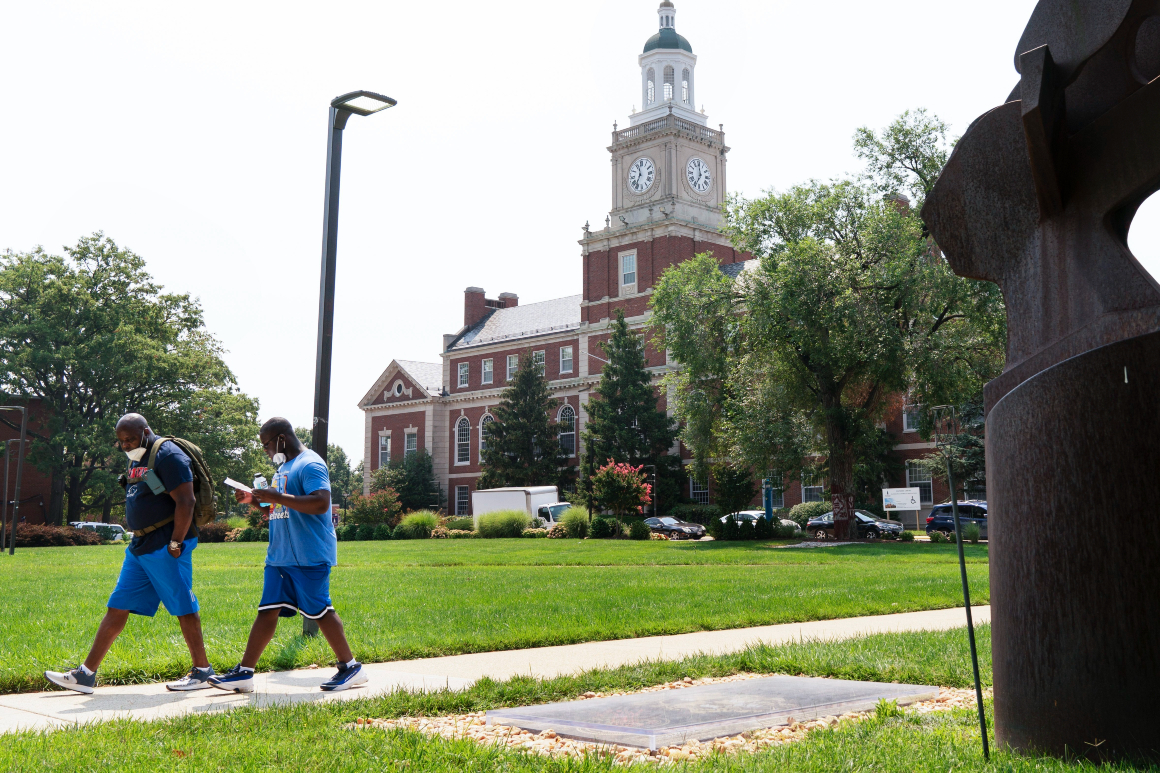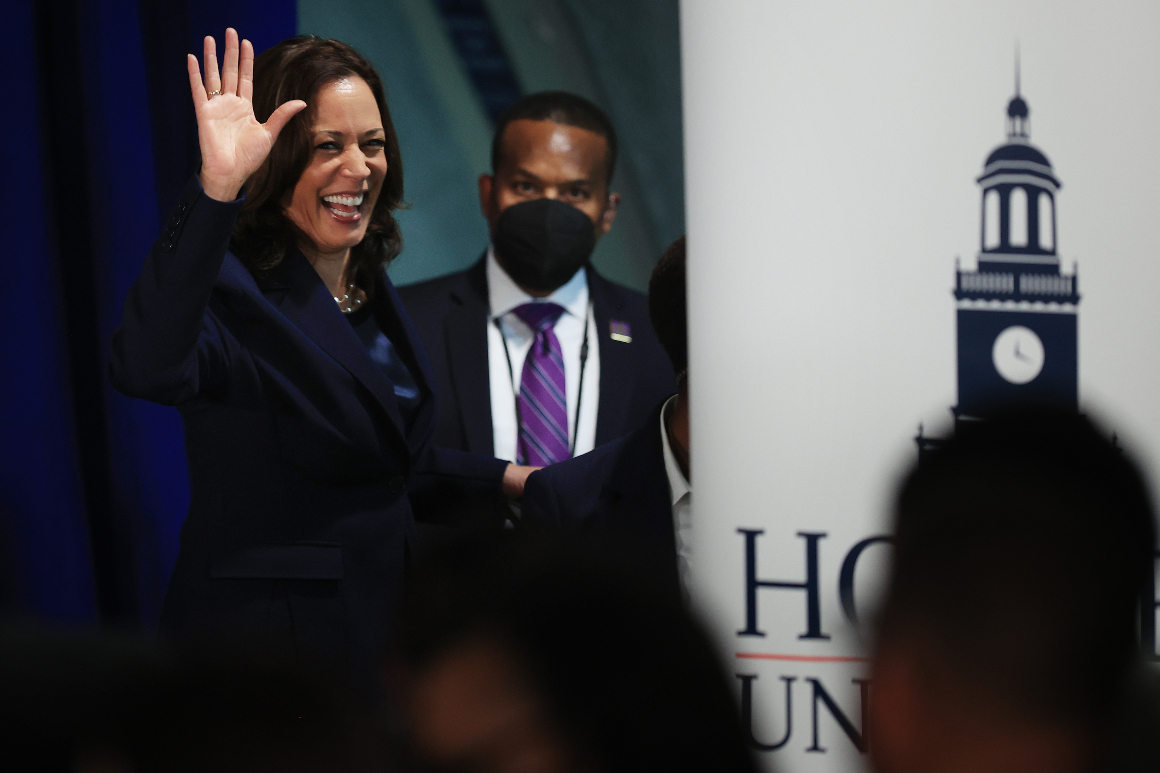
It’s Sunday, just after 11 a.m. and dozens of current and former Howard University students and alumni sit on black folding chairs under a white tent outside the famed Andrew Rankin Memorial Chapel. A choir of more than a dozen stand in front of a crowd singing a gospel song that holds a little extra weight this year.
“Hold out, don’t give up. Help is on the way.”
The help students want is both specific and broad. At its simplest level, they are demanding that the school fix their living conditions. The students say mold, rats and roaches are all over dorms and classrooms on their Washington, D.C. campus. Channing Hill, a 20-year-old junior from Texas, said as a freshman studying late at night, her “study partners were often rats.”
But beyond that, those standing in protest at arguably the most famous historically Black college and university are demanding that the Biden administration, Congress and their most famous alumnus — Vice President Kamala Harris — follow through on a promise.
Funding for the nation’s more than 100 HBCUs is one of many things in the president’s Build Back Better agenda. And from the point of its introduction in the spring, HBCU advocates and students had held out hope that President Joe Biden and Harris would deliver the $45 billion proposed for minority-serving institutions, including HBCUs like Howard.

Now it appears that the number will fall far short of the original proposal. As the Build Back Better framework was negotiated among Democrats, they steeply scaled down its scope in order to satisfy centrist members. In the process, direct HBCU funding took a significant hit. The latest draft of the legislation calls for at least $2 billion of the $10 billion in MSI funding to go to HBCUs, though with additional money for Pell Grants for those who attend those institutions. While that’s more than the federal government has ever dedicated to HBCUs and other minority serving institutions (Biden’s FY22 budget request was $1.06 billion for HBCU-specific funding), the same students who felt so hopeful in the spring are increasingly lamenting that the school won’t get the upgrade it needs.
“In this critical time, it's important that we listen. I listened,” said Bernard L. Richardson, dean of the chapel, as he took to the stage to say a prayer on Howard’s Homecoming Sunday in October. “I listened to the pain of our students and I also listened to the pain of the administrative leaders who are struggling to make things right.”
The crowd — in various styles of dress ranging from full suits, hoodies and jeans, fraternity and sorority colors abound — was with him. The murmurs of agreement and whispers of “amen” come from all over. Howard is hurting. For weeks, dozens of students have taken over the social hub of the university while sleeping on pallets, air mattresses and tents inside and outside of the building.
“At the moment, I can’t remember the last time I showered,” said Hill, who splits her time between protesting and working at a Trinidadian restaurant on Capitol Hill. “I need to wash my hair. My curly hair routine is nonexistent right now.”
Pockets of discontent like what’s being seen at Howard and other campuses may seem removed from the day-to-day legislative battles of lawmakers in the nation’s capital. But collectively, they can end up being a real problem for an administration that is already hemorrhaging political support.
There was immense hope at the start of the administration, with the quick passage of the American Rescue Plan, a vaccine rollout that saw as many as 2 million people getting inoculated daily, and the unveiling of the infrastructure and Build Back Better agenda in the spring. But setbacks in the Covid fight and haggling within the party have forced Democrats to significantly shrink the size of that spending package In the process, groups like those who have congregated and protested on Howard’s campus, have grown more despondent.
Some of the issues they’re frustrated over have little to do with the federal government. Students are asking for more transparency into how the Howard budget is handled, the reinstatement of the trustee positions of students, alumni and faculty and amnesty for student protestors from any blowback. They’ve signed petitions urging the school to cut its ties to the developer, Corvia, that manages a bulk of the campus housing.
Howard University has been adamant that things are not as bad as the students are making it seem. A university spokesperson said that only 41 rooms had mold and Howard is undergoing “top-to-bottom review of facility conditions.”
“While there have only been a small number of documented reports, we are actively seeking any issues that may be in the dorms by going door to door to address each room,” the spokesperson said. “Cabinet members have personally visited our housing facilities every week over the last month to survey dorms in an attempt to address concerns.”
But virtually everyone familiar with the protests said that as much as any individual act the school itself could do, it would be a major infusion of federal funding that would help fix the problems. Historically Black colleges and universities have been underfunded for decades, prompting protests in the past, including during the past two administrations. Biden pledged that he would put HBCUs and racial equity at the forefront of his administration. And for those in the HBCU community — and graduates of it — there were early promising signs. The first, and perhaps most significant, was Biden choosing Harris, a Howard alumnus and member of first Black sorority, Alpha Kappa Alpha Sorority, as his running mate.

“For us, the significance of Kamala's election was to say that we aren't lacking, we are just as worthy.The Blackness of it all is not unequal, is not unrefined, is not [incomparable] to the same excellence at institutions like Harvard,” Hill said. “It represented access we hadn’t seen before.”
One of the organizers of the protest, Erica England, said the expectation for Harris to “pull” for her communities looms large on campus and with Black people, though England admitted that the pressure is almost certainly unfair because, “all of her identities: being female, being Black, being AKA, being a HBCU grad, being a Howard grad, being an Indian woman” make it impossible to please everyone.
Still, there is hope — perhaps even an expectation — that Harris may wade into the protest by showing support for the students publicly. “I expected that she would definitely advocate for HBCUs because she talks about how much she loves Howard. So I'm hoping that she will. Even if she doesn't comment on Howard's protest for whatever reason, I'm hoping that she will push either behind the scenes or publicly for there to be more HBCU funding,” England said.
Harris has worked on increasing HBCU funding since her Senate days when she was able to secure more funds in the omnibus bill. A Harris aide said Harris has talked to “Representatives [Bobby] Scott, [Alma] Adams and other members of the CBC” to push for more funding. The aide said Harris also spoke with the United Negro College Fund and Thurgood Marshall College Fund on the issue.
But even if Harris were to offer her support, or drop by her old stomping grounds, it would come against the backdrop of more tangible setbacks. Biden’s original proposed $45 billion for HBCUs and other MSIs in the Build Back Better package was first cut down drastically by House Democrats before lobbying by the universities and their advocates pushed the number back up to $10 billion.
“We employed an advocacy effort to go from $2 (billion) to $10 [billion] at a time when popular policy items were being eliminated or cut,” said Lodriguez Murray, the senior vice president of public policy and government affairs at the United Negro College Fund. “We grew five times. And so that to me is where I hang my hat. That, to me, is the pride and the power of the institutions.”
One-fifth of that funding is going straight to HBCUs for exactly the issues that students at Howard are protesting — infrastructure and housing improvements. Murray said that while there is excitement for the historic investment, there’s disappointment in both the White House and Congress for the cuts but that HBCUs are still anticipating and will be demanding even more.
“Expectations were and are high” for the final bill and even more investment and focus in the future, Murray said.
That sentiment is at the core of the issues dogging the Biden administration. While the administration has proposed billions in historic spending even after congressional cuts, key constituencies are pushing for even more resources at a time where slim majorities in both the House and Senate have gummed up Biden’s plans.
The administration knows how it handles HBCUs will impact Biden’s standing with the Black community and young Black voters, specifically.
“[Biden] often says, ‘dance with the one who brung you,’ and I think in many ways, African American institutions in particular and HBCUs in specific have been a big part of that, particularly during this election cycle,” said Tony Allen, the head of Biden’s HBCU advisory board, which provides advice and recommendations to the secretary of education.
Allen, the former president of Delaware State University — the HBCU where Biden launched his 1972 senate campaign — said the administration sees the money it’s proposed (and doled out) so far as “down payments.”
But the 21-member board is not yet filled and is still going through the vetting process as it searches for an executive director. Allen, who himself just started in September, said the board will “go to work first thing in January,” adding that the administration has three top priorities out of the gate: investment in living spaces, HBCU research capacity and building stronger relationships with different federal agencies.
Cedric Richmond, senior presidential adviser and director of the Office of Public Engagement says the administration sees its focus on HBCUs as central to how it thinks about larger inequities and fairness. “For far too long, we made excuses about HBCU facilities. We said the inferior dormitories build character, the inadequate cafeteria teaches you patience, the lines at financial aid teach you perseverance,” Richmond said. “And so now the goal is to make sure that you don't have to feel like you're settling, infrastructurewise, by going to an HBCU.”
But for the students at Howard that are missing classes and showers while protesting outside of the Blackburn building, words (and even the proposed $2 billion specifically for HBCUs spread over more than a 100 institutions) have done little to assuage fears. Sitting in tents, they’re strategizing over how to score the funding that they’re seeking, hoping to finally put an end to a problem they feel has been systemic for generations. It’s painstaking, and it’s raising questions and doubts about the current political leadership. But doing this is better than studying with the rats.
“We have heard this before. Let’s be honest,” England said. “If he's really committed to racial equity, then that would include these historically Black colleges and universities, and finally giving them the care and attention that they deserve.”
----------------------------------------
By: Eugene Daniels
Title: Biden made huge promises to HBCUs. Can he sell its students on compromise?
Sourced From: www.politico.com/news/2021/11/09/biden-hbcus-howard-university-protests-520391
Published Date: Tue, 09 Nov 2021 04:30:21 EST






